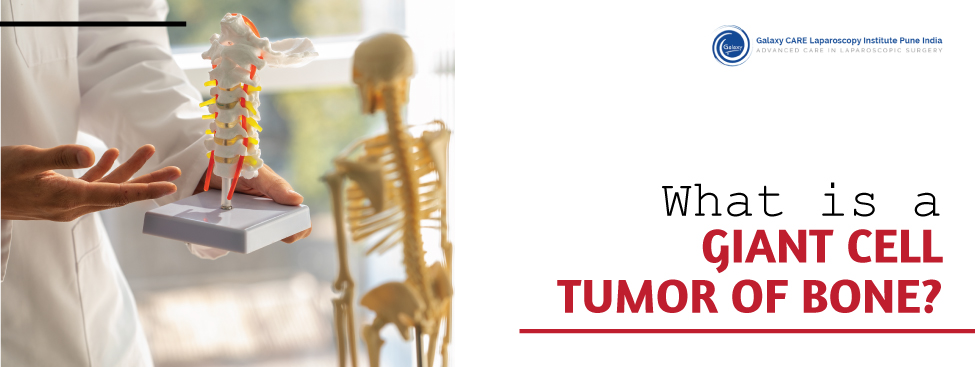
UNDERSTANDING GIANT CELL TUMOR OF BONE (OSTEOCLASTOMA)
Giant Cell Tumor of bone, also known as osteoclastoma, is a rare benign tumor which arises in the bones. These tumors usually originate from the ends of long bones, like the femur and tibia, but can also develop in other bones. While mostly benign, giant cell tumours can become aggressive and spread to other sites. These tumors are named “giant cells” due to the presence of large, abnormal, multi-nucleated osteoclast-like giant cells. They mostly affect people between 20 to 40 years of age and are slightly more common in women. As the Best Cancer Hospital in Pune, we offer cancer treatment for various types of cancers, and we understand what makes giant cell tumor of bone complex. Let us help you understand this cancer in detail.
CAUSES OF OSTEOCLASTOMA
The exact cause of giant cell tumors is unknown. They seem to develop spontaneously. In some cases, hyperparathyroidism has been associated with giant cell tumors. While abnormal osteoclast activity and certain genetic alterations are likely involved, the exact triggers that lead osteoclast cells to become tumorous remain unclear. Further research is needed to better understand the causes of osteoclastomas.
SYMPTOMS OF OSTEOCLASTOMA
Symptoms of giant cell tumors can include:
• Pain in the bone or nearby joint, that increases with activity and decreases with rest
• Swelling and tenderness around the tumor
• Limited range of motion of the adjacent joint
• Pathological fractures of the affected bone
• Sensations of weakness, numbness tingling in the limbs
These are the main symptoms of osteoclastoma. However, early lesions may be asymptomatic and detected incidentally on imaging tests done for other reasons. Any unexplained bone pain, especially in young adults, should be evaluated promptly by the Best Cancer Specialist in Pune or near you!
DIAGNOSIS OF OSTEOCLASTOMA
Diagnosis of giant cell tumors involves a physical exam followed by imaging tests like:
• X-rays – Show location and size of the tumor
• CT scans – Provide more detail about the tumor and its spread
• MRI scans – Best imaging technique to evaluate the tumor
• Biopsy – Removal of small samples of tissue to confirm the diagnosis
• Medical history and physical exam: The doctor will take a detailed medical history and conduct a physical exam to evaluate symptoms and determine the location and extent of the tumor. They will check for pain, swelling, limitation of movement and signs of fracture.
TREATMENT OPTIONS FOR OSTEOCLASTOMA
The main goals of giant cell tumor treatment are complete removal of the tumor, limiting damage to nearby tissues and structures, and preventing recurrence. Treatment options include:
Surgery
The mainstay of treatment for giant cell tumors is surgery including:
• Curettage – Surgically scraping out the tumor followed by placement of bone cement or graft to fill the cavity.
• Bone grafting – Using bone from other parts of the body or donor bone to fill the cavity.
• Reconstruction – Used for large tumors with a significant bone loss involving prosthetic implants, allografts and grafts.
Non-surgical treatments
• Chemotherapy – Not very effective as a primary treatment but can be used to reduce recurrence risks.
• Radiotherapy – Used when surgery is not possible or for aggressive tumors, but has risks of radiation-induced sarcoma.
• Targeted therapy – Drugs that target specific molecules to weaken giant cells and help control tumor growth before surgery.
PROGNOSIS AND FOLLOW-UP OF OSTEOCLASTOMA
The prognosis of giant cell tumors depends on factors like age, tumor size, location and type of treatment. Regular follow-up visits for several years after treatment are recommended to monitor for recurrence, which is common in giant cell tumors. We highly recommend consulting the Best Oncologist in Pune to ensure your timely cancer screenings.
CONCLUSION
In summary, a Giant Cell Tumor of Bone is a rare, benign tumor that originates from bone cells. Though mostly benign in nature, giant cell tumors need to be treated aggressively to prevent recurrence and metastasis. Surgery remains the mainstay of treatment with additional chemotherapy, radiation or targeted therapies to improve outcomes. Regular lifelong follow-up is important to detect recurrence at an early stage.
Galaxy Care Hospital has the Best Oncologist in Pune to help you with cancer treatment and get the most compassionate cancer care! With a team of highly experienced the latest technologies and a multi-disciplinary approach, we can effectively diagnose, treat and manage giant cell tumors of bone as per global standards. If you or your loved ones are suffering from this rare form of cancer, trust the Best Cancer Hospital in Pune. Book your appointment today!


